Everything You Need to Know About Selling Eggs on a Roadside Stand
Fresh eggs are a hot commodity, and there’s no reason you can’t sell them from your own small farm. This guide will tell you everything you need to know about starting and running a successful roadside egg stand. From the basics of getting started to marketing your eggs, we’ve got you covered!
If you’re a homesteader with a surplus of chicken eggs, why not sell your extra eggs roadside? It’s a great way to make extra money and generate immediate cash sales, But before you put up that sign, there are a few things to keep in mind.
If selling eggs is in your future, I have a few tips to help you get started.
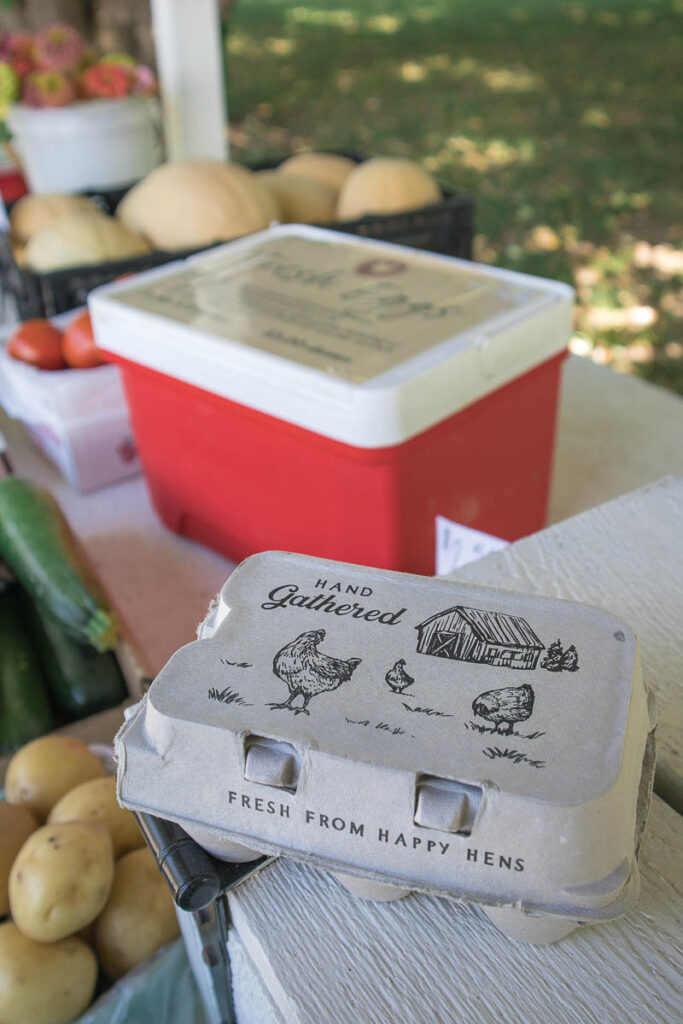
Research The Local Market
Before you start finding customers, it’s important to research your local market. Find how many farms are selling farm-fresh eggs, where people are likely to buy, and what your competition looks like. Is your homestead or farm in an area that’s busy enough to sell on a roadside stand? It’s also a good idea to read up on all the necessary regulations and qualifications to sell chicken eggs. Every state has different laws, so make sure you understand the egg laws in your area and what you need to do before you try to sell fresh eggs.
Choose The Right Hens
Picking the right chicken breed to raise will greatly influence your likelihood of making a profit selling farm-fresh eggs. You will want a more productive egg-laying breed if you want to collect plenty of eggs to sell. You might also consider raising hens who lay eggs of different colors or sizes. This will help make your offerings unique, allowing you to stand out from other farmers, especially regular store-bought eggs.
As you choose the breeds to keep in your backyard coop, pay attention to how quickly they mature, how productive they are, what kind of eggs they lay, and if they are a good fit for your climate.

Great Breeds of Eggs Laying Chickens
There are so many chicken breeds it can be difficult to decide on the right ones. Here are a few of the best egg-laying chicken breeds and an estimate of how many eggs they’ll lay a year to get you started:
Heritage Chicken Breeds:
Heritage chicken breeds are great for farmers looking for a hardy chicken that can withstand the heat and cold climates, which are great foragers and smart enough to hide from predators.
- Rhode Island Red – 260 eggs per year
- Australorp – 250 eggs per year
- Barred Rock – 200 eggs per year
- Wyandottes – 200 eggs per year
- Delaware – 200 eggs per year
- Marans – 200 per year
Hybrid Chicken Breeds
Hybrid hens lay better than dual purpose or heritage hens because they begin laying earlier and take fewer rest periods. Their smaller size also means they can convert feed to eggs more efficiently.
- California White-300 eggs per year
- Golden Comet – 250 to 300 eggs per year
- Ameraucana – 250 eggs per year
- Red Sex Link-250 to 300 eggs per year
- Pearl Star Leghorn- 250 to 300 eggs per year

Create an Appealing Brand
You must treat your business like any other to make money selling eggs. That means creating a brand that will make customers want to buy from you again and again. Start by creating a clever name and designing a simple but stylish logo. You might also want to invest in branded packaging, like custom egg cartons or labels. These days, it’s easy and relatively inexpensive to create professional-looking branding materials; there are even online services that will do it for you.
Use Social Media
In today’s world, social media is essential for marketing and selling anything – including eggs! Use platforms like Facebook, Instagram, and Twitter to post about your business, advertise special offers or deals, and engage with potential customers. You can even use social media to sell eggs directly to customers; platforms like LocalHens offer marketplace features that make it easy for buyers to find sellers in their area.
Communicate the Value of Your Eggs
As backyard chicken keepers, we put a lot of time and effort into caring for our small flocks, which often sets local roadside stands eggs apart from those in grocery stores. Your practices, methods, and techniques are a key component of what makes your farm, and eggs unique. Many customers enjoy knowing that the free-range eggs they buy are laid by humanely treated chickens able to roam and forage, resulting in very fresh and often tastier eggs.
Share this additional information with your potential customers on a website or social media post – and be sure it has your contact information too!
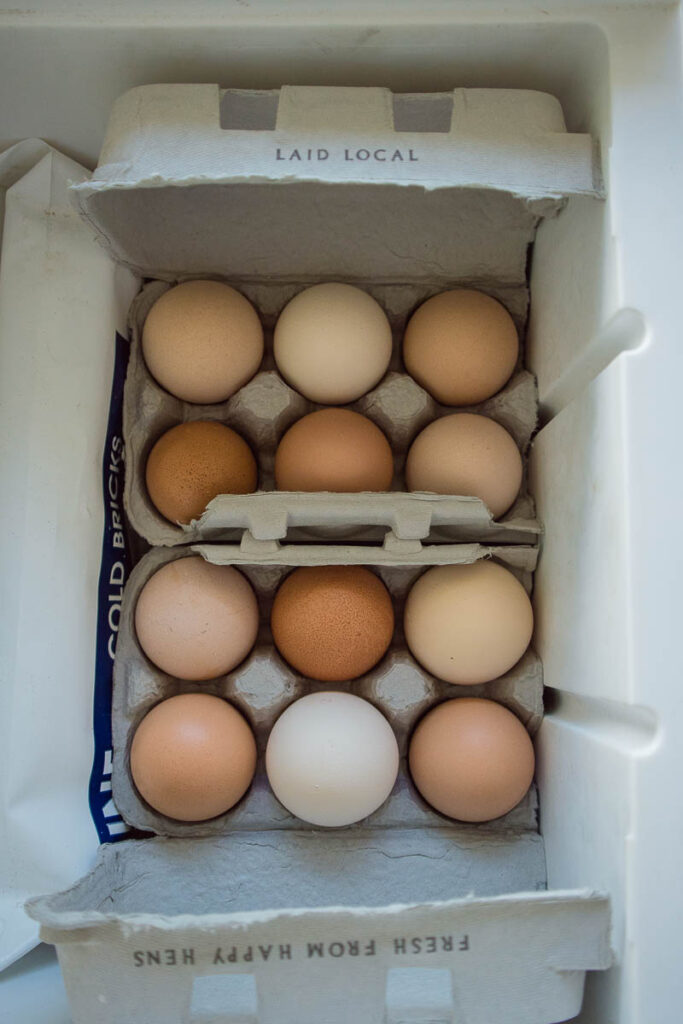
What are the safety regulations for selling eggs?
You need to be aware of a few safety regulations when selling eggs. Make sure to research local requirements. The rules around selling eggs vary, so check with your local laws about what is required.
In New York State, small farms and egg producers (under 3000 birds) must follow these guidelines:
- Cartons must be labeled with the word “eggs.”
- The cartons must state the count – may be expressed in dozens.
- The producer’s name, address, and zip code must be on the carton.
- All cartons must have the words “keep refrigerated.” on them
- All cartons must have the food safety and safe handling instructions that read: “To prevent illness from bacteria: keep eggs refrigerated, cook eggs until yolks are firm, and cook foods containing eggs thoroughly.”
- When labeling and marketing your eggs, keep in mind, In New York State, only eggs that have been inspected can be labeled and marketed as “fresh.”
- Also, the eggs must be refrigerated at retail and maintained at a temperature of 45°F or below.
- New York State doesn’t specify if small producers must wash their eggs before sale. But the eggs should be visibly clean (free of filth, dirt and fecal matter.)
- Small-scale producers can sell ungraded eggs. And you also, do not have to fill the carton with eggs of the same size or color. For instance, you can vary the size with two extra-large eggs from a Jersey Giant, two large from a production layer, and two small from a bantam.
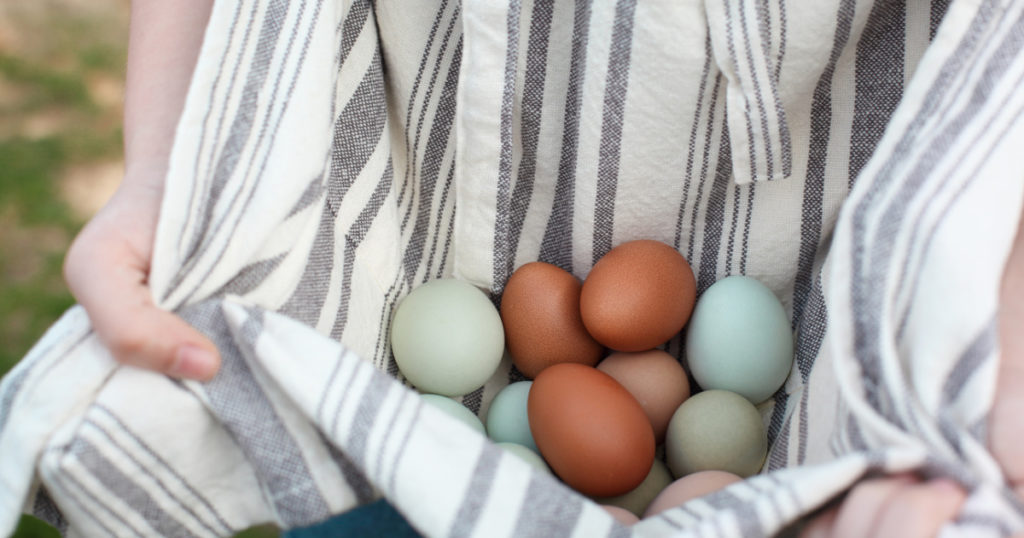
Washed Eggs vs. Unwashed Eggs
There is debate on whether to wash eggs, and both sides make good arguments. The state you live in largely determines whether or not you must wash your eggs before they are sold. Some states require that small producers wash eggs, while others do not specify. Make sure you understand the local regulations in your area and what you need to do before you sell fresh eggs.
Poultry specialists cannot seem to agree about washing or not washing eggs, with some strongly recommending washing, while others say that eggs should not be washed because if you do it wrong, you could be introducing bacteria into the egg that the egg’s natural bloom would have otherwise protected. Regardless of how you prepare your eggs before the sale, do not attempt to wash and sell extensively dirty eggs.
You can sell your eggs safely by following these tips:
- Collect eggs often. Most birds will lay their eggs by 10:00 am daily. It is best to collect the eggs as soon as possible after they are laid. The longer the egg is allowed to stay in the nest, the more likely the egg will get dirty, broken, or lose quality.
- Keep your nesting boxes clean– follow good agricultural practices. Maintaining clean and dry conditions and a sanitary environment inside the coop will require time, effort, and regular replacement of bedding. Clean nesting boxes weekly and replace soiled litter with clean nesting material. Thoroughly clean and disinfect the entire coop at least once a year using approved disinfectants available at feed stores.
- New York State doesn’t specify if small producers must wash their eggs before the sale. I prefer not to wash my eggs to keep the bloom intact.
- Store eggs small end down in an egg carton to keep the air cell stable.
- Date the cartons- so you can use or sell the oldest eggs first and rotate your extra eggs. You should sell all eggs within five days of being collected.
- Keep your eggs refrigerated. Eggs should be stored in a refrigerator at 40-45°F and 70-75% relative humidity.
- Never store eggs with materials that have an odor. Eggs pick up the odors of apples, fish, onions, potatoes, and other food or chemicals with distinct odors.
- Discard any eggs that are cracked or damaged. Eggs that are cracked or damaged are more likely to harbor bacteria.
- Use new cartons, or make sure your egg cartons are clean and in good condition. Egg cartons that are dirty or in poor condition can contaminate the eggs.
- Label egg cartons with contact information. Egg cartons should be labeled with the date the eggs were laid, the address of the producer, and your contact information.
How much should I charge for eggs?
Price is one of the trickiest things to consider when selling eggs. You must balance making a profit and being competitive with other farmers and grocers in your area. Start by calculating your cost of production, including the cost of feed, housing, and any other necessary supplies. Then, research the going rate for eggs in your area and price accordingly. Remember, you can always adjust your prices as needed; if you’re not selling as many eggs as you’d like, try lowering your price slightly.
The price of a dozen eggs can vary depending on several factors, including the type of chicken, the quality of the egg, and your local market. However, most people in my area charge between $3 and $5 per dozen for regular eggs and $5 to $8 for specialty eggs.
Locally, a fair amount of people raise their chickens for eggs, so I have quite a bit of competition. I sell eggs for $3 a dozen. That price is more than the grocery store’s regular white or brown eggs but less than the organic, cage-free, free-range eggs sold in the grocery store. In different areas of the country, you may be able to charge more per dozen.
What do I need to start selling eggs?
To start selling eggs, you will need a few supplies:
- An easy-to-clean egg collection basket- Collect eggs in an easy-to-clean container like plastic coated wire egg baskets. This will prevent stains from rusted metal and contamination from other materials which are difficult to clean and disinfect.
- Clean Egg Cartons – You’ll need somewhere to put your eggs! Egg cartons can be purchased from Amazon or a farm supply store. Often friends and family are happy to give you egg cartons that would have been sent to the recycling bin. Just make sure they are clean and in good condition.
- A cooler – You’ll need a way to keep your eggs cool during transport and at your roadside stand. A small cooler with ice packs should do the trick.
- A table or stand – You’ll need somewhere to display your eggs for sale. A folding table or card table will work fine. Make sure it’s sturdy enough to hold your coolers full of egg cartons.
- Signs – You’ll need some signs to let people know you’re selling eggs. You can make your own or purchase some from a farm supply store. Just make sure they are visible and easy to read.
- Money box– We use an honesty box on our farmstand. Because the stand is at the end of our driveway, this system works well. Many people are happy to count out their change, drop it into the cash box, and be on their way. We also have a sign with our Venmo and PayPal information for customers who may be short of cash or hadn’t planned on stopping.
- Change – You’ll need small bills and coins to make changes for your customers.
- Business cards– Handing out a business card is a great way to promote your egg business. You can include your contact information and price list on the cards.
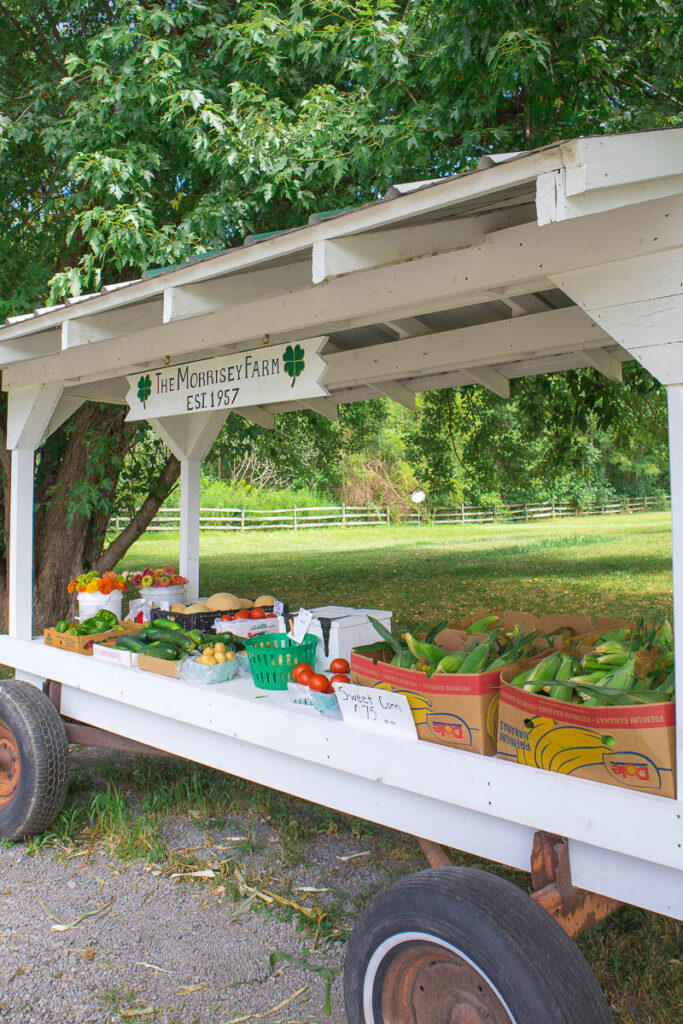
Location, Location, Location
When choosing a location for your egg stand, there are a few things to keep in mind:
You’ll want a location that is visible to passing traffic. Look for a spot with high traffic, but check with your local laws about setting up a stand on the side of the road.
You’ll also want a location close to your home or farm. This will make transporting your eggs and supplies to and from your stand easier.
Finally, you’ll want a location with shelter from the elements. A spot under a tree or next to a building can provide some protection from the sun and rain.
Selling backyard chicken eggs on a roadside stand is a great way to make extra money. It’s also a great way to get to know your neighbors and build relationships with people in your community. Raising backyard chickens is a fun and rewarding experience to see people enjoy the eggs you’ve raised!
Sources:
- “Sanitary Regulations for Direct Marketing – Agriculture and Markets.” New York State Agriculture and Markets, Mar. 2020, https://agriculture.ny.gov/system/files/documents/2020/03/sanitaryregulationsforfarmersmarkets_0.pdf
- “Regulations for Selling Eggs in New York State.” Cornell Cooperative Extension, June 2003, https://tioga.cce.cornell.edu/agriculture/regulations-for-selling-eggs-in-new-york-state.
-
“Cornell Cooperative Extension Southwest New York Dairy, Livestock & Field Crops Program.” Selling Eggs? Here’s What You Need to Know – Southwest New York Dairy, Livestock & Field Crops Program – Cornell University – Cornell Cooperative Extension, https://swnydlfc.cce.cornell.edu/submission.php?id=1117&crumb=livestock%7C10





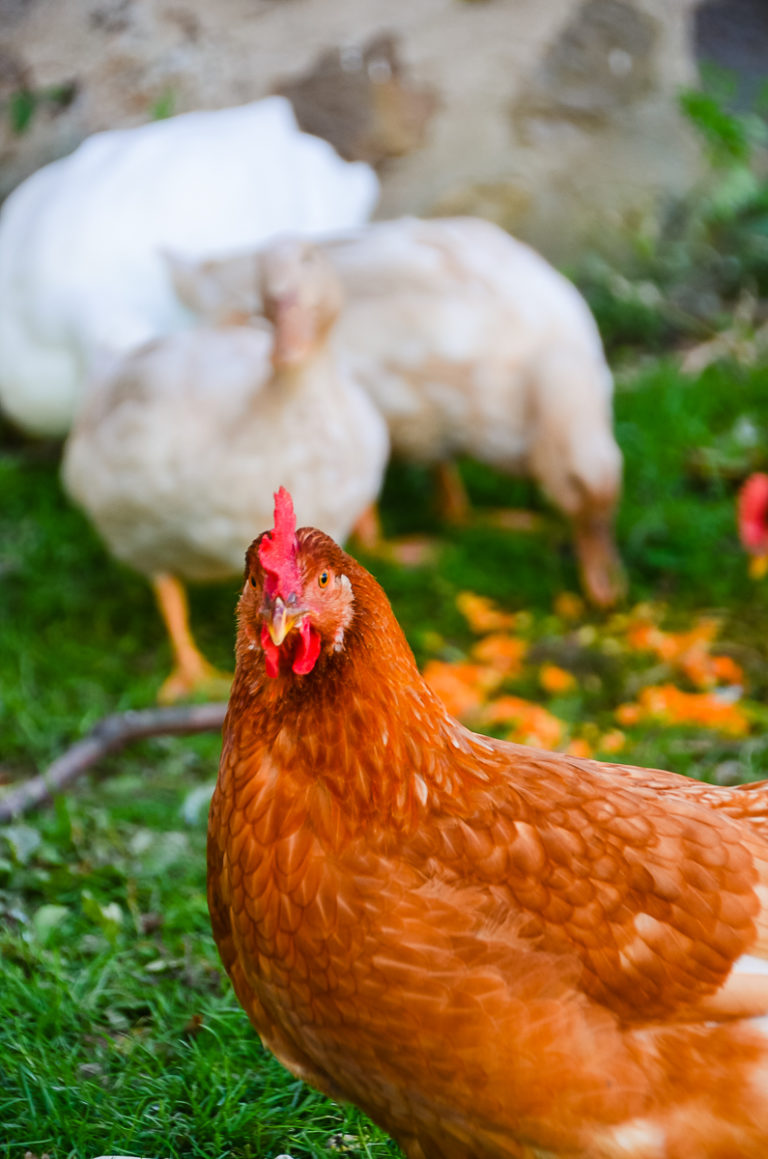


How do you keep them from feezing on your roadside stand in the winter?